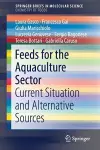
Feeds for the Aquaculture Sector
7 authors - Paperback
£49.99
Laura Gasco is an Associate Professor at the Department of Agricultural, Forest and Food Sciences (DISAFA) of the University of Turin (Italy), and her main research is focused on fish, rabbits and poultry nutrition. Graduated as an agricultural engineer at the Université catholique de Louvain (UCL), Belgium (1992), Laura Gasco moved to Ireland to obtain a Diploma in Business Administration (University of Limerick), and then to the University of Turin where she became PhD in Animal Sciences, and researcher (1999). Since 2012, Laura Gasco is involved in trials on insects as feed for fish and poultry in collaboration with Italian and international research groups.
Francesco Gai is a permanent researcher at the Institute of Sciences of Food Production, National Research Council, Grugliasco, Italy, where he studies the animal nutrition of monogastric species with a special focus on aquaculture. Francesco Gai obtained his PhD degree in Animal Productions (2006) at the University of Turin, Italy, and since 2012, he is involved in experimental projects on the utilization of insects for feed purposes, in partnership with different European research groups.
Giulia Maricchiolo obtained her PhD degree in Anatomy of Fish species and Birds at the Faculty of Veterinary of University of Messina (Italy), and she is a permanent researcher at the Institute for Coastal Marine Environment (IAMC) of the National Research Council, Messina (CNR, Italy). Giulia Maricchiolo is responsible for the Aquaculture facility of IAMC-CNR – a structure authorised for Animal experimentation (in accordance with the Legislative Decree No 26/2014) by the Italian Ministry of Health, and for the Animal Welfare structure of the IAMC-CNR. She is also President of the Organism Responsible for Animal Welfare in the same institution.
Lucrezia Genovese is currently a Senior Scientist of the Institute for Coastal Marine Environment (IAMC) of the National Research Council (CNR, Italy), and coordinates several national programs for studying marine fish species and the interactions between aquaculture and environment. Her research interests include: development and standardization of new breeding and reproduction methodologies under experimental conditions; research of candidate species for aquaculture; evaluation of environmental effects on the welfare of reared specimens; fish pathology; assessment of feeds in fish farming; environmental suitability of mariculture sites. Recently, she is also actively collaborating in microbial ecology studies. Lucrezia Genovese is author of more than 100 scientific publications, and she is also engaged in teaching and training activities.
Sergio Ragonese is a senior fisheries biologist involved in the fields of assessment and management of wild living stock exploited mainly by the Mediterranean bottom trawl fisheries. He works at the Italian National Research Council, Institute for Coastal Marine Environment, Mazara del Vallo, Italy. Due to his activity, he can be considered as a ‘fisheries cleaner’, i.e., a scientist who analyses both historical and current fisheries literature. The work conducted by Sergio Ragonese aims at highlighting anomalies and contradictions (if any) in the developed life history pattern, paradigms of the exploited stock and corresponding assessment and management plans proposed to recover and rebuild fishable resources.
Teresa Bottari is a permanent researcher at the Institute for Coastal Marine Environment (IAMC) of the Italian National Research Council (CNR), Messina, Italy. She studied the health of marine environment, fish pathology and quality during her PhD graduation, and has participated in the following projects: MEDITS - evaluation of demersal resources in the Mediterranean Sea; CAMPBIOL - monitoring of commercial catches; and RITMARE - Use of fish parasites as biological tags for stock discrimination. Currently, Teresa Bottari is author of 40 scientific articles on stock assessment and management of demersal resources and marine parasitology.
Gabriella Caruso is a Researcher at the National Research Council, Institute for the Coastal Marine Environment (IAMC-CNR) of Messina (Italy) since 1994. Her research activity focuses on aquatic microbes and their role in carbon and phosphorus biogeochemical cycles, as well as on microbial pollution detection methods. Her expertise also includes animals' welfare with respect to fish digestive physiology and immune system and environmental monitoring of aquaculture sites. Involved in several national and international research programs, she was qualified as a Full Professor in Ecology in 2014. Gabriella Caruso has been involved in different academic activities, including membership of the Executive Plankton and Aquaculture Committees of the Italian Society for Marine Biology (SIBM). She has served as a Referee and Editorial Board member for several international journals, and Guest Editor for a Special Issue of The Open Marine Biology Journal.